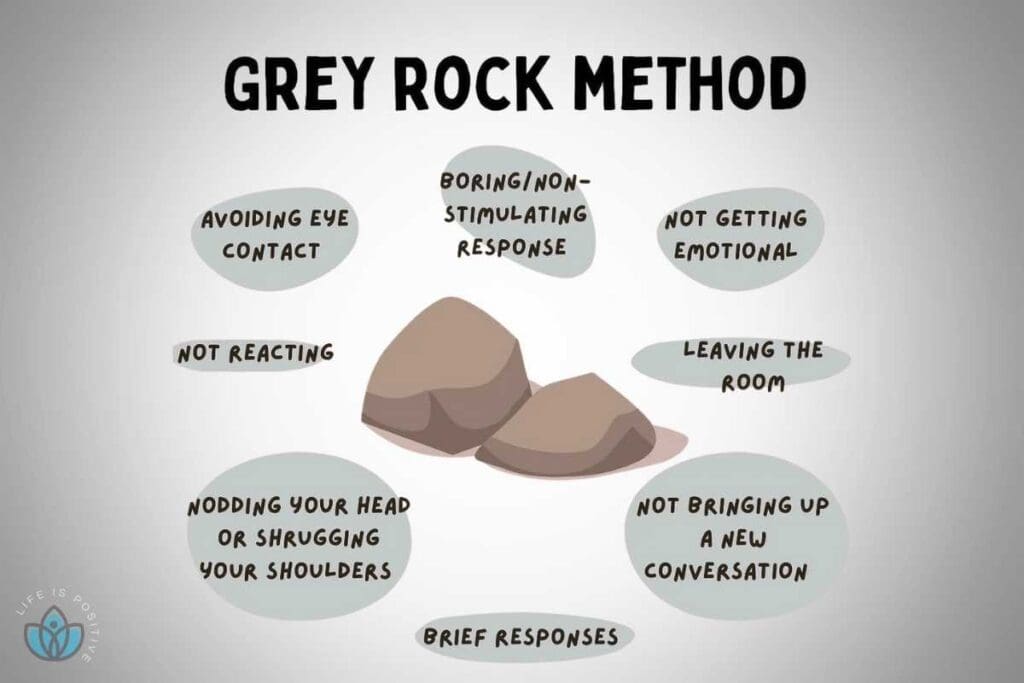|
Getting your Trinity Audio player ready...
|
Ever feel like you’re starring in someone else’s emotional drama, and all you want is a remote to mute the chaos? Enter the Grey Rock Method—your spiritual pause button for dealing with toxic or manipulative behavior.
The Grey Rock Method is all about becoming as emotionally uninteresting as… well, a grey rock. No reactions, no drama, no fuel for their fire. It’s a calm, centered way to protect your peace without escalating the situation.
Think of it as setting a quiet boundary with spiritual swagger—grounded, detached, and in total control of your energy. Let’s dive into how this powerful tool works.
What is the Grey Rock Method?
So, what exactly is the Grey Rock Method? Picture this: you’re dealing with someone who thrives on drama, control, or emotional chaos.
Instead of taking the bait or getting caught up in the whirlwind, you choose to respond with all the excitement of—yep—a grey rock. Uninteresting. Unbothered. Emotionally neutral. That’s the essence of the grey rock method.
It’s not about being cold or rude. It’s about protecting your energy. Especially useful when you’re dealing with narcissists, manipulators, or anyone who feeds off emotional reaction, this technique helps you step out of their game entirely.
By keeping your responses minimal, factual, and calm, you give them… nothing. No fuel. No attention. No satisfaction. It’s like putting up an invisible energetic shield. You stay grounded. You stay at peace. And you remind yourself that not every battle deserves your fire.
Why the Grey Rock Method Works Like Magic
Tired of feeling like a puppet in someone else’s emotional theater? The grey rock method is your backstage exit. It works because manipulators and toxic personalities feed on reactions—whether it’s your tears, your frustration, or your need to defend yourself.
When you go grey rock, you starve that craving. You become emotionally unappetizing. No drama, no deep convos, no visible triggers—just calm, bland responses. And guess what? That lack of fuel makes them lose interest.
It’s not about being fake—it’s about choosing not to engage in cycles that drain you. Over time, it builds emotional distance and gives you space to think clearly and stay grounded.
You reclaim your peace without having to shout or slam doors. Magic? Maybe. Empowering? Absolutely. The grey rock method isn’t silence—it’s a strategy. And for anyone dealing with manipulative energy, it’s one of the smartest tools in the boundary-setting toolbox.
Here’s why this method is so effective:
• It removes their supply – Drama seekers thrive on your reactions. No reaction = no fuel.
• It keeps you sane – Instead of getting sucked into endless arguments, you stay calm and detached.
• It helps you avoid confrontation – Without outright ignoring them, you subtly push them away.
• It teaches emotional control – Mastering this technique builds emotional intelligence and resilience.
How to Use the Grey Rock Method
So, how do you actually put the Grey Rock Method into practice? Follow these key steps:
1. Keep Responses Short and Uninteresting
Instead of engaging in long debates or emotional discussions, keep your responses dull and uninspiring. If they ask about your weekend, say, “It was fine.” If they push for details, keep it vague: “Just ran some errands.” No excitement, no elaboration, no fuel.
Read: How To Break The Cycle of Toxic Relationships
2. Avoid Sharing Personal Information
The less they know about you, the less they can use against you. Don’t share your struggles, successes, or future plans. Keep conversations strictly surface-level, like discussing the weather or sports scores.
3. Be Emotionally Unavailable
Toxic individuals want to provoke emotional reactions. Whether it’s anger, sadness, or frustration, they feed off your feelings. The Grey Rock Method helps you stay emotionally neutral—think of yourself as a wall, unaffected and unmoved by their tactics.
4. Limit Eye Contact and Body Language
Even if you’re saying little, your body language can give away frustration. Keep your expressions neutral, avoid excessive eye contact, and resist the urge to roll your eyes (as satisfying as that may be).
5. Don’t React to Provocations
They might try to bait you with insults, guilt trips, or shocking statements. Don’t fall for it. The best response? A calm, nonchalant “Hmm,” or “Okay.” They can’t argue with someone who refuses to argue back.
Read: How to Release Anger: 3 Healthy Ways
When NOT to Use the Grey Rock Method
While the Grey Rock Method is incredibly effective, there are situations where it may not be the best approach:
• In abusive relationships – If you’re in a physically or emotionally abusive situation, it’s crucial to seek professional help rather than relying solely on this technique.
• With healthy relationships – Not every difficult person is toxic. If someone is struggling emotionally, shutting them out completely may not be fair.
• If it’s making YOU feel drained – If constantly suppressing emotions is affecting your mental health, consider alternative strategies.
How to Handle Pushback
Once toxic people catch on that you’re pulling the ol’ Grey Rock Method, don’t be surprised if they crank up the crazy. Think guilt trips, baiting comments, or dramatic outbursts designed to reel you back in. It’s like emotional clickbait—don’t click. Stay chill, stay boring, stay unbothered.
Here’s the thing: when they realize their favorite toy no longer reacts, they’ll eventually get bored and move on. But if their behavior turns aggressive or crosses into scary territory, forget the strategy—prioritize your safety. Sometimes, the smartest way to protect your peace is to walk away completely.
Boundaries are beautiful. Silence can be loud. And you don’t owe anyone access to your energy, especially not someone who treats your emotions like a game. The Grey Rock Method isn’t just a technique; it’s an act of self-respect.
Read: How To Know If Your Relationship Is Toxic
Final Thoughts: Grey Rock Method
Let’s be honest—dealing with toxic behavior can feel like emotional dodgeball. That’s where the grey rock method steps in like a quiet superhero. It’s not loud. It doesn’t need applause. But it works.
Whether you’re dealing with a manipulative ex, a drama-loving coworker, or a high-maintenance family member, this technique helps you hold your energy close and keep your peace intact.
The beauty of the grey rock method is that it’s subtle but powerful. You’re not cutting people off or creating more conflict—you’re simply not entertaining it. You show up calm, collected, and emotionally off-the-grid. Over time, the drama fades, and your clarity grows.
So, if you’ve been feeling drained by someone’s chaos, remember: you don’t have to react to everything. Be the rock. Stay steady. And let your silence do the heavy lifting. You’ve got better things to vibe with.
For more empowering content, connect with our vibrant community here ➡️ Social Media.



